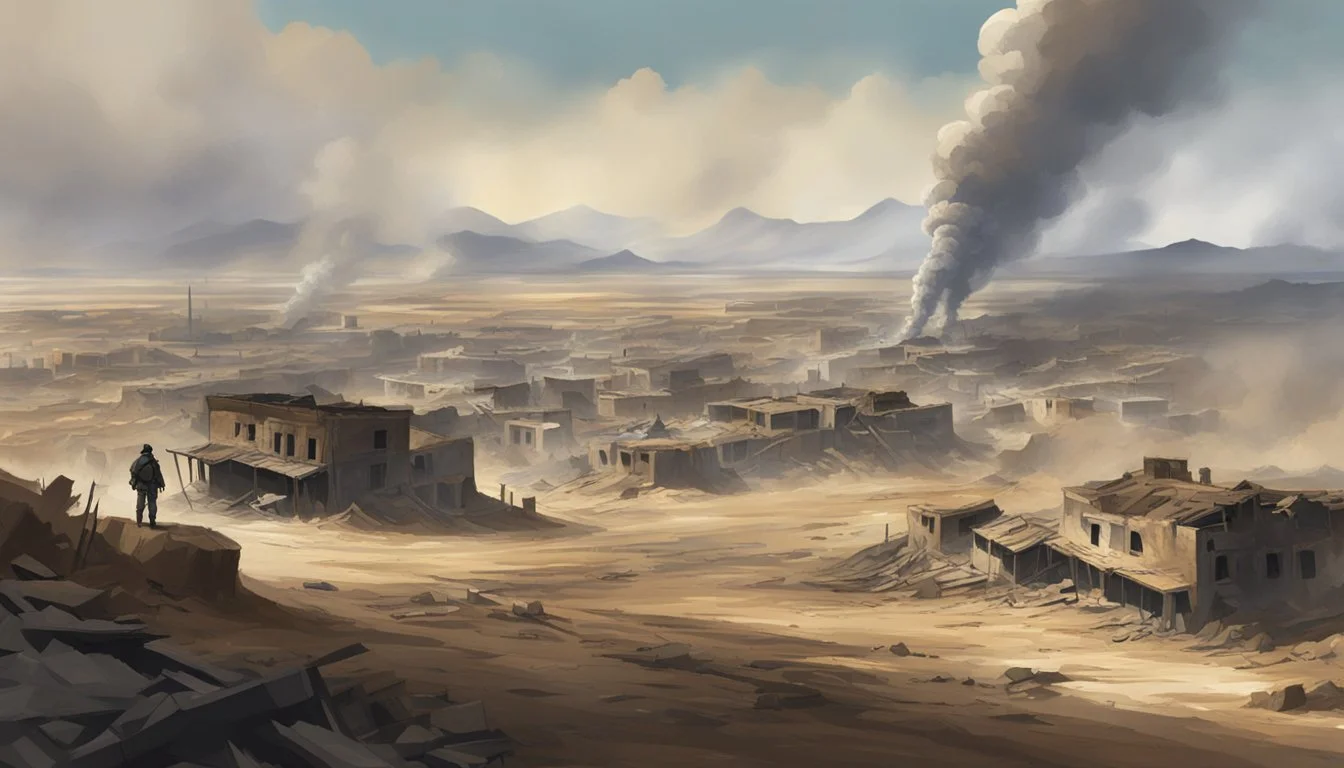7 Films That Explore the Brutality and Ideology of ISIS
A Critical Analysis of Extremism in Cinema
The Islamic State of Iraq and Syria (ISIS) has left an indelible mark on recent history, capturing global attention through its brutal tactics and extremist ideology. Documentaries and films have emerged as powerful tools to examine the complex factors behind the rise of ISIS and its impact on individuals and societies.
These films offer viewers unique insights into the inner workings of ISIS, exploring its recruitment methods, propaganda techniques, and the experiences of those affected by its actions. By delving into personal stories and expert analyses, these documentaries provide a nuanced understanding of the group's motivations and the challenges involved in combating its influence. Through careful examination of ISIS's origins, methods, and consequences, these films contribute to public awareness and foster critical discussions about extremism and global security.
1) "City of Ghosts" by Matthew Heineman
"City of Ghosts" is a gripping documentary that exposes the brutal reality of life under ISIS rule in Raqqa, Syria. Directed by Matthew Heineman, the film follows the brave citizen journalists of "Raqqa Is Being Slaughtered Silently" (RBSS).
These activists risk their lives to document and share the atrocities committed by ISIS in their hometown. The film provides a raw, unflinching look at the dangers faced by RBSS members as they work to counter ISIS propaganda.
Heineman's documentary captures the emotional toll on these journalists, who face constant threats and witness unimaginable violence. The film showcases their determination to expose the truth, even as they are forced into exile.
"City of Ghosts" offers a powerful testament to the importance of journalism in the face of extremism. It highlights the personal sacrifices made by those who dare to stand against ISIS and its ideology.
Through intimate footage and interviews, the documentary provides a unique perspective on the conflict in Syria and the global impact of ISIS. It serves as a sobering reminder of the ongoing struggle against extremism and the power of information.
https://en.wikipedia.org/wiki/City_of_Ghosts_(2017_film)
2) "The State" directed by Peter Kosminsky
Peter Kosminsky's "The State" offers a gripping portrayal of four British citizens who join ISIS in Syria. This 2017 television drama explores the complex motivations and harsh realities faced by those drawn to extremist ideologies.
The series delves into the initial idealism of its characters and their subsequent confrontation with the brutal realities of life under ISIS rule. Kosminsky's direction provides a nuanced look at the psychological journey of the protagonists.
"The State" stands out for its unflinching depiction of ISIS's inner workings. It showcases the group's recruitment tactics, daily life in their controlled territories, and the strict enforcement of their interpretation of Islamic law.
The drama's strength lies in its focus on individual stories, humanizing its characters while not shying away from the consequences of their choices. It presents a thought-provoking examination of radicalization and its impact on both individuals and society.
[https://en.wikipedia.org/wiki/The_State_(British_TV_series)]
3) "Isis: Women Unveiled" by Ellie Flynn
"ISIS: Women Unveiled" is a 2015 documentary directed by Joanna Potts that examines the lives of women under ISIS rule. The film runs for 44 minutes and features journalist Poppy Begum investigating the realities faced by women in ISIS-controlled territories.
The documentary sheds light on the strict regulations and harsh treatment imposed on women by the extremist group. It explores topics such as forced marriages, limited freedoms, and the role of women within the ISIS ideology.
Through interviews and undercover footage, the film provides a rare glimpse into the experiences of women living under ISIS control. It aims to expose the brutality of the regime and its impact on women's rights and daily lives.
"ISIS: Women Unveiled" received moderate reviews from critics and audiences, with an IMDb rating of 6.1 out of 10. The documentary serves as an important resource for understanding the gender dynamics within ISIS-controlled areas.
https://www.imdb.com/title/tt5206542/
4) "The Road to Mosul" by Olivier Sarbil
"The Road to Mosul" is a documentary film directed by Olivier Sarbil that offers a gripping look at the fight against ISIS in Iraq. Released in 2016, the film follows Iraqi forces as they advance towards Mosul to reclaim the city from ISIS control.
Sarbil's camera captures intense combat scenes and the devastating aftermath of ISIS occupation. The documentary showcases the bravery of Iraqi soldiers and the challenges they face in urban warfare.
The film provides insight into the tactics used by ISIS, including their use of human shields and suicide bombers. It also highlights the toll of the conflict on civilians caught in the crossfire.
"The Road to Mosul" stands out for its raw and unflinching portrayal of the battle against ISIS. Sarbil's intimate access to the frontlines gives viewers a visceral sense of the dangers and complexities involved in the fight.
https://www.imdb.com/title/tt6156794/
5) "Path of Blood" directed by Jonathan Hacker
"Path of Blood" offers a chilling glimpse into Al-Qaeda's operations in Saudi Arabia from 2003 to 2009. The documentary utilizes hundreds of hours of footage captured by Saudi security services.
Director Jonathan Hacker takes an unconventional approach, presenting the material in present tense without traditional narration. This technique immerses viewers in the raw reality of terrorist activities.
The film exposes the recruitment and radicalization process at jihadi boot camps in the Saudi desert. It shows young men being indoctrinated into extremist ideology and planning attacks against Western targets.
"Path of Blood" documents horrific car bombings in Riyadh and the subsequent cat-and-mouse game between terrorists and Saudi authorities. The footage provides an unfiltered look at the perpetrators' mindset and methods.
By relying solely on primary source material, the documentary offers a unique perspective on Islamic terrorism. It reveals the stark contrast between the terrorists' brutal actions and their often mundane daily lives.
https://en.wikipedia.org/wiki/Path_of_Blood
6) "A Dark Place" by Betsy Leimbach
"A Dark Place" is a 2018 thriller film directed by Betsy Leimbach. The movie explores the psychological impact of ISIS ideology on individuals and communities.
Set in a small American town, the film follows Donald Devlin, a garbage truck driver who becomes obsessed with solving the mysterious disappearance of a young boy. As Devlin delves deeper into the case, he uncovers disturbing connections to ISIS recruitment and radicalization.
Leimbach's direction creates a tense atmosphere, highlighting the insidious nature of extremist ideologies. The film examines how ISIS propaganda can infiltrate even seemingly safe and isolated communities.
Through its narrative, "A Dark Place" showcases the brutality of ISIS by depicting the emotional and psychological toll on those affected by the group's influence. The movie serves as a stark reminder of the far-reaching consequences of extremism.
https://www.imdb.com/title/tt6237488/
7) "Mosul" directed by Matthew Michael Carnahan
"Mosul" is a 2019 Arabic-language American war action film that offers a gritty portrayal of the fight against ISIS. Set during the 2016 Battle of Mosul, the film follows an Iraqi SWAT team as they struggle to liberate their city from ISIS control.
Director Matthew Michael Carnahan, known for his screenwriting work, makes his directorial debut with this intense and visceral depiction of urban warfare. The film is based on true events, drawing inspiration from a New Yorker article about the real-life Nineveh SWAT team.
"Mosul" stands out for its authentic approach, featuring an all-Middle Eastern and North African cast. This choice lends credibility to the storytelling and provides a unique perspective on the conflict.
The film immerses viewers in the chaotic and dangerous streets of Mosul, showcasing the brutal tactics employed by both ISIS and those fighting against them. Through its unflinching portrayal, "Mosul" highlights the human cost of the battle and the determination of local forces to reclaim their home.
Released on Netflix in 2020, "Mosul" brings attention to a critical moment in the fight against ISIS, offering audiences a raw and unfiltered look at the realities of modern urban warfare.
https://en.wikipedia.org/wiki/Mosul_(2019_action_film)
The Rise of ISIS
The Islamic State of Iraq and Syria (ISIS) emerged as a major threat in the Middle East, shocking the world with its rapid expansion and brutal tactics. Its rise was fueled by a complex mix of ideological, political, and social factors.
Origins and Ideological Roots
ISIS traces its roots to Al-Qaeda in Iraq, founded by Abu Musab al-Zarqawi in 2004. The group initially fought against U.S. forces during the Iraq War. It embraced a radical interpretation of Sunni Islam, advocating for the establishment of a caliphate.
Following Al-Zarqawi's death in 2006, the group rebranded as the Islamic State of Iraq (ISI). It gained strength during the Syrian Civil War, exploiting the power vacuum and sectarian tensions in the region.
ISIS adheres to an extreme version of Salafi jihadism, rejecting modern concepts of nation-states and promoting a literal interpretation of Islamic texts.
Key Figures and Leadership
Abu Bakr al-Baghdadi emerged as the central figure in ISIS's rise to power. He became the group's leader in 2010 and declared himself caliph in 2014. Al-Baghdadi's charisma and strategic acumen played a crucial role in ISIS's expansion.
Other key figures included Abu Muhammad al-Adnani, the group's chief spokesperson, and Abu Ali al-Anbari, who oversaw operations in Syria.
ISIS's leadership structure combined elements of a terrorist organization with those of a proto-state, featuring a complex bureaucracy and chain of command.
Territorial Expansion
ISIS's territorial conquest began in earnest in 2013, capturing cities in Syria including Raqqa, which became its de facto capital. In 2014, the group launched a stunning offensive in Iraq, seizing Mosul, the country's second-largest city.
At its peak in 2015, ISIS controlled an area roughly the size of Great Britain, spanning parts of Syria and Iraq. The group implemented its harsh interpretation of Islamic law in these territories.
ISIS's expansion was facilitated by its sophisticated use of social media for recruitment and propaganda. The group attracted thousands of foreign fighters from around the world.
Portrayal of ISIS in Cinema
Films depicting ISIS offer unique perspectives on the group's ideology and impact. They explore historical contexts, violent extremism themes, and face challenges in accurate representation.
Historical Context in Film
Documentaries like "ISIS: Women Unveiled" provide historical background on ISIS's rise. This 2015 film exposes networks of female extremists in the UK supporting jihad. Other films trace ISIS's origins in the aftermath of the Iraq War and Syrian conflict. They often highlight the power vacuum that allowed the group to gain territory and followers.
Some movies set their narratives against the backdrop of real events, such as the fall of Mosul or the siege of Kobani. These historical touchpoints give viewers a frame of reference for understanding ISIS's expansion and brutality.
Themes of Violent Extremism
Films about ISIS frequently explore themes of radicalization and extremist ideology. They depict the group's strict interpretation of Islamic law and its brutal enforcement methods. Many movies show ISIS's use of propaganda to recruit followers, especially through social media.
Some films focus on the experiences of former ISIS members, like in "The Secret World of ISIS." This documentary features an ex-member speaking about the organization's inner workings. Other movies highlight the impact of ISIS's violence on local populations, showing beheadings, slavery, and destruction of cultural heritage.
Challenges of Accurate Representation
Filmmakers face significant hurdles in portraying ISIS accurately. Access to firsthand information is limited due to the dangerous nature of the subject. Many rely on interviews with defectors, refugees, or external observers.
There's a delicate balance between showing ISIS's brutality and avoiding sensationalism. Some films, like "City of Ghosts," focus on citizen journalists risking their lives to document ISIS atrocities. This approach offers a more personal perspective on the conflict.
Filmmakers must also navigate complex political and religious issues. They strive to distinguish between ISIS's extremist views and mainstream Islam. This nuanced portrayal is crucial to avoid promoting stereotypes or fueling Islamophobia.
Impact of ISIS on Global Security
The rise of ISIS posed significant challenges to international security and stability. Its brutal tactics and extremist ideology reverberated far beyond the territories it controlled, affecting nations worldwide.
Counterterrorism Efforts
ISIS's expansion prompted a global response. Many countries formed coalitions to combat the group militarily and financially. Intelligence sharing increased among nations to track and prevent terrorist activities. Law enforcement agencies worldwide enhanced their capabilities to detect and disrupt ISIS-inspired plots.
Governments implemented stricter border controls and travel restrictions to limit the movement of foreign fighters. Online platforms faced pressure to remove extremist content and prevent radicalization. Counter-narrative campaigns were launched to challenge ISIS propaganda.
These efforts weakened ISIS's territorial control but highlighted the challenges of combating a decentralized threat. The group's ideology continued to inspire lone-wolf attacks in various countries.
Humanitarian Consequences
ISIS's brutality caused immense suffering and displacement. Millions fled conflict zones, creating a refugee crisis that strained resources in neighboring countries and Europe. Many faced trauma, loss of homes, and disrupted education.
The group's destruction of cultural heritage sites erased irreplaceable historical artifacts. Its targeting of minorities, including Yazidis and Christians, led to mass atrocities and urgent humanitarian interventions.
Rebuilding efforts in former ISIS-held areas remain ongoing. Clearing landmines, restoring infrastructure, and addressing psychological trauma are key priorities. International aid organizations continue to provide support, but the scale of devastation poses long-term challenges.







